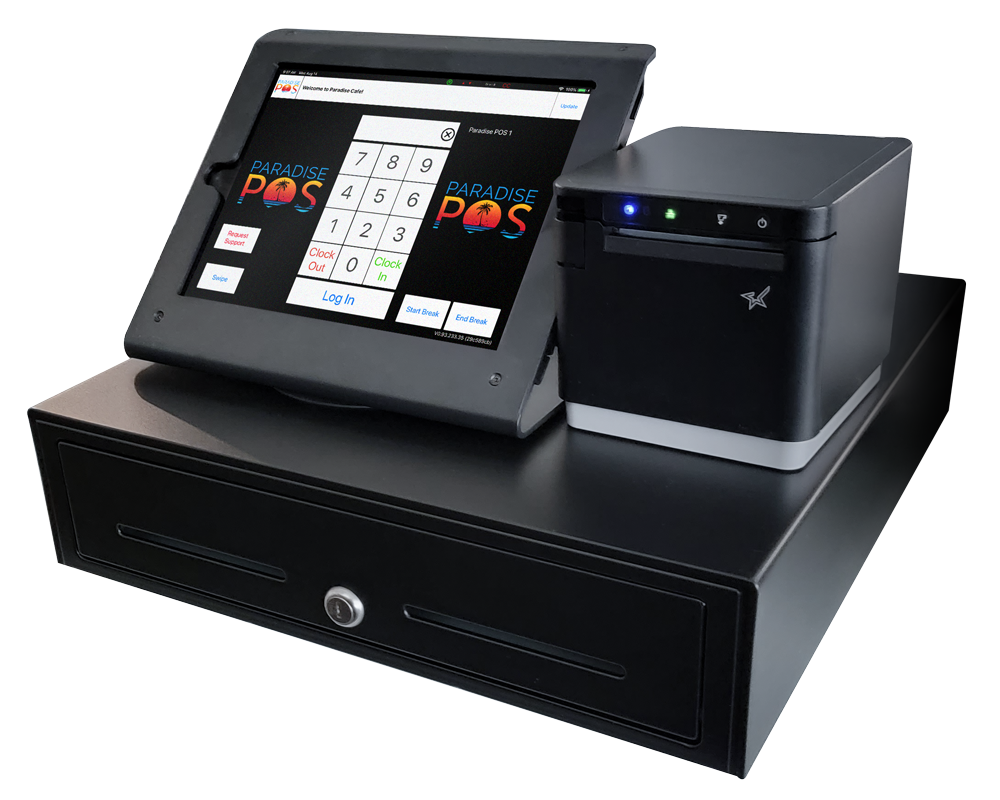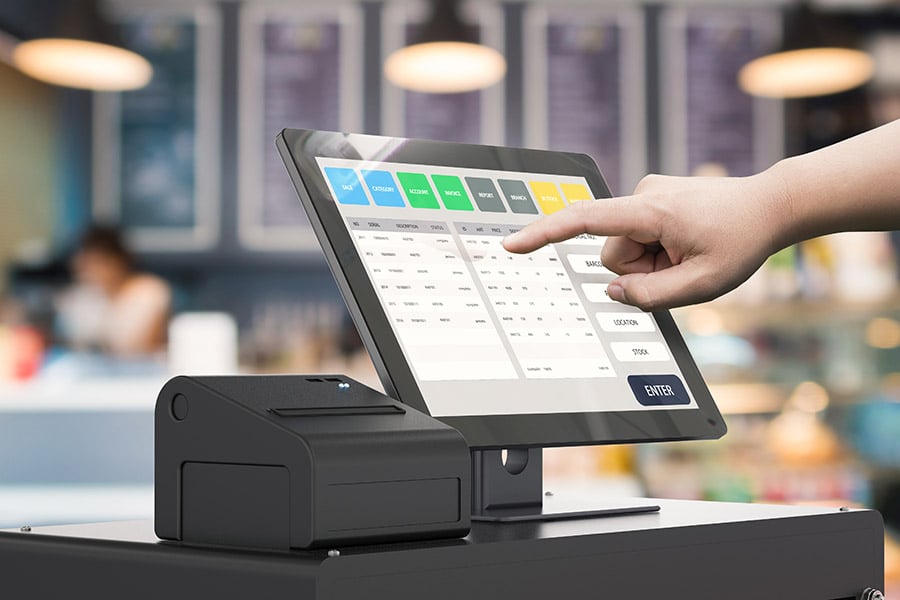The Facts About Clover Pos Uncovered
The Facts About Clover Pos Uncovered
Blog Article
The Greatest Guide To Restaurant Pos

Point of Sale Systems: Retail Point-Of-Sale Solutions Streamline Deals
Fascination About Pos Software

Hardware Components of a Point of Sale System What makes a POS system tick? It's not just software application; the hardware plays a starring role. Consider it as the body to the software's brain. Without the ideal hardware, even the most sophisticated POS software is just a pretty face. Important POS Hardware So, what are more info the must-haves? Let's break it down. The main processing system, frequently a computer system or tablet, is the heart of the operation. The screen or touchscreen display allows personnel to connect with the system. A barcode scanner accelerate the checkout procedure. Keep in mind the days of manually entering each code? The dependable invoice printer provides customers with a record of their purchase. A money drawer keeps your cash safe and organized. A card reader allows clients to pay with credit or debit cards. Diving Deeper: Beyond the Essential However wait, there's more! Depending upon your organization, you might need specific hardware. For instance, a restaurant might integrate cooking area printers to relay orders, while a store might use label printers for product tagging. Ever question how your regional bakeshop instantly prints those delicious-looking labels? Selecting the Right Hardware: A Balancing Act Picking the ideal hardware isn't almost purchasing the most expensive equipment. It's about finding the sweet area in between functionality, resilience, and budget plan. A small organization simply beginning might choose a more standard setup, while a high-volume retailer will need robust, high-performance makers. Is it much better to purchase new or used? Consider your alternatives thoroughly. A new system provides the most recent innovation and guarantee security, however a reconditioned system can conserve you money. The Future of POS Hardware What does the future hold? Anticipate to see a lot more integration with mobile phones, biometric scanners for staff member authentication, and advanced analytics control panels showed on bigger, clearer screens. Imagine a world where stock is instantly upgraded in real-time as products are scanned-- a world where you can track your very popular item from anywhere in the world. The possibilities are endless, and the hardware is continually developing to meet the demands of today's businesses. Are you all set to update your point of sale system?
Software Application Features and Capabilities: The Heart of Your POS System
Ever see a seasoned barista glide through a busy morning rush? Their trick isn't just caffeine; it's a smooth dance with their POS system. The software application is the conductor of your company symphony, managing everything from sales to stock. But what notes should you be listening for? What capabilities really matter in today's market?
Stock Management: Beyond Counting Beans
Forget spreadsheets that haunt your dreams. Modern POS systems offer real-time inventory tracking, signaling you when your stock of artisanal coffee beans dips precariously low. Believe of it as a digital guardian angel, avoiding those awkward "Sorry, we're out!" moments to clients. What if you could also forecast need based upon historical information? Many systems now provide forecasting tools, a powerful weapon against overstocking and lost sales. This helps prevent the circumstance of running out of popular products or accumulating excess stock of slow-moving items, both of which can constrain money circulation and space.
Sales Reporting and Analytics: Decoding the Data
Sales information is the brand-new gold, and your POS system is the miner. Forget feeling in one's bones just how much you offered today. Dive deep into the data to uncover trends, recognize your best-selling items, and understand client habits. Which menu product sets completely with the everyday special? Which promo resonated most with your clients? These insights are not simply fascinating; they're actionable intelligence. Without reliable sales reporting, browsing the complexities of service decision-making ends up being like cruising without a compass, increasing the opportunity of errors and missed chances.
Consumer Relationship Management (CRM): Structure Bridges, Not Walls
Keeping in mind a routine customer's name and preferred order is captivating, however scaling that individual touch is difficult. POS systems with CRM capabilities permit you to track client purchase history, choices, and even birthdays. Think of immediately offering a discount on their birthday-- a little gesture that fosters commitment and motivates repeat business. But there is the potential snag of bad information quality, which can result in unreliable client profiles and inadequate marketing efforts.
Payment Processing: Simplifying the Transaction
The checkout experience can make or break a sale. Seamless integration with various payment techniques-- credit cards, mobile wallets, even copyright-- is non-negotiable. Can your system deal with split payments? Does it offer secure tokenization to protect customer data? A clunky payment procedure resembles striking a sour note in your organization symphony, possibly interfering with the entire efficiency. Guaranteeing compatibility with progressing payment innovations and adherence to security requirements are vital for preserving customer trust and operational performance.
Staff Member Management: Keeping the Team in Sync
From clocking in and out to managing permissions and tracking performance, employee management features simplify operations and enhance accountability. Is scheduling a nightmare? Many POS systems use integrated scheduling tools, enhancing staffing levels based upon forecasted need. A typical obstacle that is frequently neglected is the difficulty of incorporating employee management functionalities with payroll systems, which can cause mistakes and inefficiencies in wage computations.
Advanced Characteristics: Leveling Up Your Operations
- Table Management: Ideal for restaurants, this feature enables you to visualize your dining-room, track table status, and handle appointments.
- Loyalty Programs: Reward your finest clients and encourage repeat organization with incorporated loyalty programs.
- Online Purchasing Combination: Effortlessly incorporate your POS system with online buying platforms to broaden your reach.
Picking the ideal POS system is about more than simply functionality; it has to do with finding a partner that can grow with your business. Consider your existing requirements, prepare for future development, and don't be afraid to ask the hard concerns. The right software application can change your service from a disorderly cacophony into a harmonious work of art.
Industry-Specific POS System Applications
Think about the local pastry shop, dynamic with morning consumers yearning fresh croissants. A generic POS system might deal with transactions, however can it handle complicated dishes, track ingredient inventory, or immediately change production schedules based upon sales data? Most likely not. That is where the appeal of industry-specific POS systems shines.
Dining establishments and Hospitality
For bustling dining establishments, speed and precision are paramount. The number of times have you seen servers juggling orders, modifications, and splitting costs, all while trying to supply excellent service? A dining establishment POS system streamlines these procedures, permitting table management, kitchen order tickets, and even online purchasing combination. These systems frequently consist of features like ingredient-level inventory tracking, essential for managing food expenses and reducing waste. Ever wonder why your favorite meal is often not available? It may come from a lack of correct inventory management.
- Table Management
- Cooking Area Order Tickets
- Online Buying Combination
- Ingredient-Level Inventory Tracking
Retail Solutions
Retail, with its diverse inventory and customer interactions, demands a different set of tools. Think of a store clothing store having a hard time to track sizes, colors, and seasonal collections utilizing a basic checkout system. An industry-specific retail POS system provides functions like barcode scanning, client loyalty programs, and detailed sales reporting. These systems can even incorporate with e-commerce platforms, providing a seamless omnichannel experience for consumers. Did you know some retail POS systems can anticipate future sales patterns based upon historic information? Now that is effective!
The Hazards of a Mismatch
Selecting the incorrect POS system can produce considerable functional hurdles. A clothing boutique using a dining establishment POS, for example, would find it unsuitable for managing inventory with sizes and colors. The lack of proper reporting and analytics could lead to misinformed buying decisions and lost profits. The outcome could be similar to trying to fit a square peg in a round hole.
Secret Considerations
Selecting an industry-specific POS system requires careful evaluation. Believe about your service's unique requirements and operational workflows. Does the system integrate with existing software application? Does it offer the needed reporting abilities? Is it scalable to accommodate future growth? A well-chosen POS system is not just a deal tool; it's a tactical possession that can drive effectiveness, enhance client satisfaction, and ultimately, boost your bottom line. Remember, it is a financial investment in your business's future, not simply an expenditure.
Security Considerations for Point of Sale Systems
Ever heard the tale of the mom-and-pop shop that lost everything due to the fact that of a single, overlooked security flaw in their POS system!.?. !? It's a cautionary tale, and it highlights a critical element typically overshadowed by the attraction of expensive features and structured operations. The reality is, a POS system is only as great as its security. What good is a system that crunches numbers in a flash if it permits lawbreakers to swipe consumer's information simply as rapidly?
The Vulnerability Minefield
The digital landscape is a battlefield. Every POS system, regardless of size or sophistication, is a possible target. Are you truly got ready for the dangers hiding around the corner? The real pinch comes when you find that your outdated software has a gaping hole that hackers can exploit, turning your service into an unwitting accomplice in identity theft. The difficulty is that hackers are crafty and are constantly altering their methods.
Common Security Spaces and Specialist Tips
- Weak Passwords: "Password123" isn't sufficing. Usage strong, distinct passwords for all POS system accounts and change them regularly. Two-factor authentication is a must.
- Unsecured Networks: Your Wi-Fi is like leaving the front door open. Protect your network with strong encryption (WPA3 if possible) and consider a different network for your POS system.
- Outdated Software Application: Software suppliers spot security holes all the time. Failing to upgrade is like welcoming difficulty. Establish automated updates or schedule routine upkeep.
- Employee Training: Your personnel is your first line of defense. Train them to recognize phishing attempts, safeguard passwords, and report suspicious activity.
Data File Encryption: Your Shield Versus the Dark Arts
Think about data encryption as a secret code. It scrambles delicate details, like charge card numbers, making it unreadable to unauthorized users. Without file encryption, your customers' monetary information resemble sitting ducks, ripe for the selecting by cybercriminals. It's not almost securing your consumers; it's about safeguarding your reputation and avoiding hefty fines.
PCI Compliance: The Rulebook You Can't Overlook
If you accept charge card, you're bound by the Payment Card Market Data Security Requirement (PCI DSS) It's a set of security requirements developed to secure cardholder information. Stopping working to comply can lead to fines, penalties, and even the loss of your capability to process credit card payments. It's a headache, yes, but it's a required one. Believe of PCI compliance as the expense of doing business in the digital age.
Consider this: every transaction processed through your point of sale is a prospective entry point for malicious stars. By carrying out robust security measures, you're not simply securing your company; you're protecting your clients' trust and ensuring the long-term practicality of your operations. The security of your POS system isn't simply a technical problem; it's an organization essential. It requires constant alertness, proactive procedures, and a commitment to staying ahead of the curve.